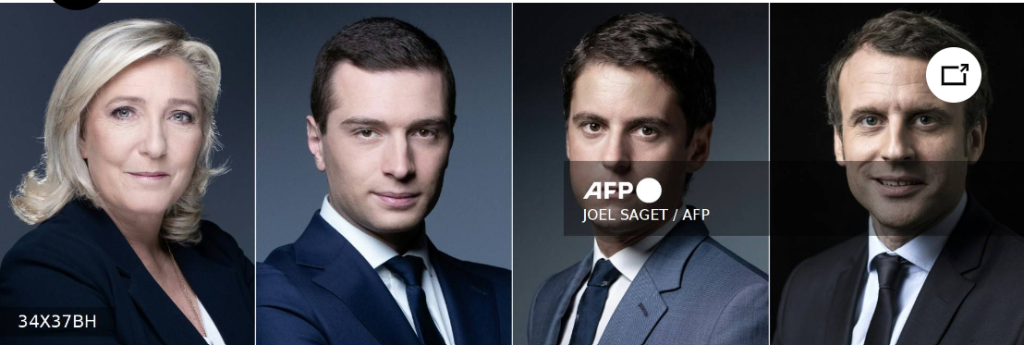
The election campaign in France has officially begun with President Emmanuel Macron’s centrist alliance gearing up for a tough battle against the far right.
President Macron made the bold move to call for snap parliamentary elections three years ahead of schedule, aiming to bring a political shake-up after his centrist party was defeated by the far right in the EU elections.
With less than two weeks remaining before the polls, Macron’s alliance is facing challenges from new coalitions emerging on both the left and right sides of the political spectrum.
The decision by Macron to call for elections just before France hosts the Olympics has left many perplexed, as there is a risk of the far-right National Rally leading the government with 28-year-old Jordan Bardella potentially becoming the prime minister.
“Emmanuel Macron, who initiated this dissolution to outmaneuver other parties, has now found himself in a difficult position,” warned Le Monde, suggesting that the RN could emerge victorious in the election.
Candidates had until Sunday evening to enroll for the 577 seats in the National Assembly lower house before the official start of campaigning at midnight. The first round of voting is set for June 30, with the crucial second round scheduled seven days later.
The political upheaval has even reached the Euro 2024 football tournament, where French star player Kylian Mbappe expressed his stance against extreme ideologies and divisive concepts, urging young people to vote during this pivotal moment in French history.
“Today, we are faced with the imminent threat of extremists coming into power, and we have the chance to shape the future of our nation,” Mbappe emphasized.
“I sincerely hope that I can continue to wear this jersey with pride after July 7.”
Macron’s dissolution of the parliament following the victory of the far right in the EU elections has significantly redefined the political landscape in France.
“The objective is to form a new parliamentary majority,” former Prime Minister Edouard Philippe, who heads a party allied with Macron’s bloc, shared in an interview with BFMTV.
To Macron’s surprise, a new left-wing coalition called the New Popular Front, comprising Socialists, Greens, and the hard-left France Unbowed party, has emerged. Meanwhile, on the right, Eric Ciotti, leader of the Republicans (LR), has formed an election pact with the RN, triggering internal dissent within the LR party.
Adding to the complexity, the new left-wing alliance has started showing signs of division, with the controversial figure Jean-Luc Melenchon from LFI being deemed too polarizing for consideration as prime minister by some.
Prime Minister Gabriel Attal, leading the campaign for Macron’s bloc, highlighted that voters have three distinct choices to make.
“There is the alliance led by the hard-left LFI, the alliance led by the far-right RN — extremes that would be detrimental to the country,” he explained to RFL broadcaster.
“And then there is a third bloc… which we are spearheading.”
This week, Macron is expected to return to the domestic campaign trail after engagements abroad at the G7 summit in Italy and the Ukraine peace conference in Switzerland.
For the President, the stakes are high as he risks losing relevance until the end of his term in 2027, potentially paving the way for Marine Le Pen of RN, who is likely to run for the Elysee for the fourth time.
Former Socialist Prime Minister Lionel Jospin, who retreated from politics in 2002 after losing to Jean-Marie Le Pen in the presidential elections run-off, cautioned Macron about the risks associated with the rushed election campaign.
“This hurried campaign is irresponsible and gives the RN an opening to seize power in France,” Jospin criticized in an interview with Le Monde, accusing Macron of arrogance and suggesting that mere surprises won’t guarantee control over the outcome.
Former President Nicolas Sarkozy also voiced concern, stating that Macron’s decision could plunge France into a chaotic situation with severe difficulties in recovering.
AFP
